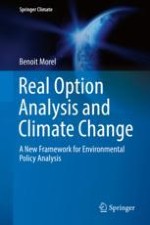2020 | OriginalPaper | Buchkapitel
7. Prioritizing the Investments Needed to Avoid the Unmanageable (Mitigation) and to Manage the Unavoidable (Adaptation)
verfasst von : Benoit Morel
Erschienen in: Real Option Analysis and Climate Change
Aktivieren Sie unsere intelligente Suche, um passende Fachinhalte oder Patente zu finden.
Wählen Sie Textabschnitte aus um mit Künstlicher Intelligenz passenden Patente zu finden. powered by
Markieren Sie Textabschnitte, um KI-gestützt weitere passende Inhalte zu finden. powered by
